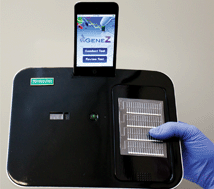Biomarker testing incorporates all biomarkers genomic and non-genomic testing and molecular testing that patients. Genetic testing will serve to relieve such fears and tension.
 A Comparison Of Different Genetic Testing Strategies Download Scientific Diagram
A Comparison Of Different Genetic Testing Strategies Download Scientific Diagram
Point-of-care genetic testing identifies variations in the genetic sequence at the bedside enabling clinicians to react and alter therapy based upon the results.

What is the point of genetic testing. Family history has an integral role in some disease patterns and just by being born in a given family link one to getting such undesirable conditions in future such circumstances causes a lot of anxiety and even depression in people. Genetic testing looks for specific inherited changes variants in a persons genes. Point-of-Care genetic testing is going beyond the laboratory as FDA granted its first CLIA waiver to a nucleic acid based test.
Genetic variants can have harmful beneficial neutral no effect or unknown or uncertain effects on the risk of developing diseases. The result is more efficient planting for farmers along with better quality food for consumers. Through DNA evaluation of different strands of plant life agriculturalists can determine which seeds will produce the healthiest yields.
There are two terms that are used for genetic testing preimplantation genetic diagnosis PGD and preimplantation genetic screening PGS. Genetic testing of embryos is when testing is done on the cells to determine the embryos viability for transfer through IVF. Key Points Become familiar with terminology of biomarker and genetic testing for an inherited mutation so you can talk with your.
The point-of-care genetic testing market includes various types of testing includes diabetes hematology oncology infectious disease and others indications. Genetic testing helps produce crops that are maximally resistant to disease pests and the effects of the climate. A genetic test is a medical procedure that identifies changes and mutations in the chromosome genes or protein of your DNA which might indicate a potential for future disease illness or abnormality.
Harmful variants in some genes are known to be associated with an increased risk of developing cancer. Mistakes in our genes called pathogenic variants can manifest the disease and genetic tests may be used to confirm the disease diagnosis. Traditional genetic testing involves the analysis of DNA in order to detect genotypes related to a heritable disease or phenotype of interest for clinical purposes.
Genetic testing also plays an important role in food and agriculture. The results of a genetic test can confirm or rule out a suspected genetic condition or help determine a persons chance of developing or passing on a genetic disorder. Genetic testing can identify population traits that can be linked back to early warning signs of serious illness or disease as the Genetic Alliance UK points out.
Although they sound similar there is a major difference between the two. Or It is also defined as type of medical test identifies changes in chromosomes genes or proteins. DNA tests can find diseases such as certain cancers heart disease Alzheimers and diabetes to name a few.
A genetic testing is analyzing a DNA to look for genetic alteration that may indicate an increased risk for developing a specific disease or disorder. Genetic testing helps avoid uncertainty about health situations. Genome testing can also trace the ancestral history of a persons family.
Genetic testing can also identify individuals who might be interested and eligible to participate in clinical trials of new treatments. Genetic testing is a type of medical test that identifies changes in genes inherited from our parents which we then typically pass on to our children. Testing for genetic diseases is a relatively new frontier and one in which social workers can help clients navigate the ethical and social challenges of choosing whether to get tested and learn the results.
Genetic testing is a type of medical test that identifies changes in chromosomes genes or proteins.

/heart-failure-causes-40-5ae0bcdec673350037cb2ddd.png)